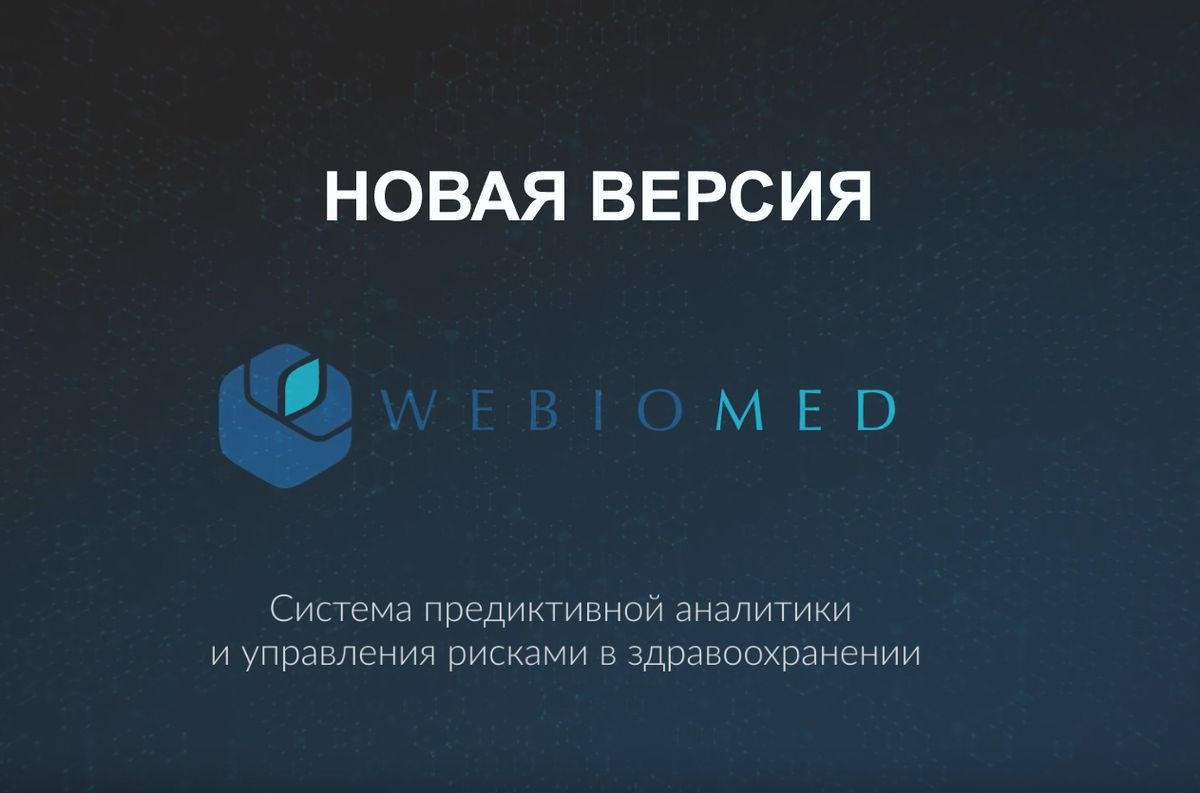
K-SkAI announces preparations for the release of a new version of Webiomed, the predictive analytics and risk management system in healthcare based on artificial intelligence.
The main task that was set for the team of researchers and developers of the system was to expand the predictive capabilities of the Webiomed platform, increase the number of supported clinical conditions for analysis, improve accuracy in risk group assessment, and increase productivity.
The new version of Webiomed includes the following improvements:
1. New architecture for the interaction of services within the Webiomed platform, which allows providing the following critical features:
- Automatic connection of medical data obtained from different medical organizations. Now Webiomed can automatically connect the data inside the de-identified databank when requests are received. This allows significant improvement of the predictive accuracy of models and algorithms. For instance, if earlier the system received requests for risk assessment separately from various types of medical organizations such as ambulance stations, hospitals or ambulatory care settings, now Webiomed can automatically track a patient's path and generates more accurate assessment based on all this data, connecting it inside its database.
- Caching of processing results: when receiving requests for data assessment, now Webiomed checks the results of the latest data interpretation. If no new data has been received, and no new models or algorithms have been placed in the system, the latest up-to-date response is automatically returned to the MIS. Due to this feature, it is possible to increase the speed of system operation significantly. The Webiomed.DataSet service is used as a caching service.
- Prior features extraction: previously, Webiomed extracted features from obtained data "as received". As the number of nosologies and models increased, the risk of excessive system response time to incoming requests increased. In this regard, the function for automatic pre-extraction of data was added. With this new feature, Medical Information System can send data from EHR to Webiomed before using Webiomed in industrial mode. Webiomed will remember this data and perform prior data cleaning and processing, including feature extraction using the NLP service. Further, when a request is received from a workplace, Webiomed will already contain preliminary information necessary for analysis. Due to this, it is possible to significantly increase the speed of the system operation as well as provide the necessary scalability margin for functional development.
2. Extended list of risk groups
Now Webiomed performs analysis for 6 nosological groups:
- Cardiovascular diseases (CVD)
- Diabetes Mellitus
- Respiratory diseases
- Infectious diseases
- Obstetrics and Gynecology
- Drug-Related diseases

3. Detection of suspected cases of diseases
In the new version of Webiomed, in addition to identifying risk factors and assessing risk groups, suspected cases of diseases can be determined as well. In fact, it provides medical information systems with a ready-made symptom checker service. In the first version of the service, the most common and socially significant diseases were added: ARVI (acute respiratory viral infection), acute bronchitis, pneumonia, diabetes, osteoarthritis, alcohol addiction syndrome, gastritis, stomach ulcer, hemopathy, and some others.
4. Improved system of decision rules and internal optimization of connected models of data analysis
The system has been internally optimized and the interaction of risk assessment models based on machine learning and their connection with decision rules has been improved. The reference list of features has been verified, including many mathematical functions for processing a series of numeric features. The reference list of risk factors, pathologies, and deviations verified and is now linked to all components within the system. The usability and functionality of the expert system were improved, which allows our medical experts to configure the system's algorithms and rules effectively.
5. New predictive analytics models
The new version of Webiomed focuses on machine learning models for assessing diabetes risks, as well as further development of cardiovascular diseases track.
More information about our predictive models is published on the page (in Russian): https://webiomed.ai/machine-learning/
6. Detection of suspected cases of COVID-19 and assessment of COVID-19 risk factors
Due to the current pandemic of new coronavirus infection, the identification and assessment of risk groups is an urgent task. In this regard, models for automatic detection of suspected cases of COVID-19 and risk group assessment have been developed. Timely identification of high-risk patients will help to predict the risks of severe COVID-19, the need for an ALV, hospitalization in the ICU, and death of a patient.
7. Improved version of the Webiomed.DataSet for collecting and processing depersonalized medical data
The new version has an automatic feature extraction upon receipt of the new documents. What is more, a function of data caching is provided, as well as work on optimization and increasing the speed of the system.

8. Improved version of the Webiomed.NLP service
Several models for extracting data from unstructured EHRs are now added to the new version of the service. Now the system supports extraction of more than 40 various features, including objective data, COVID – 19 symptoms, information about medication intake, laboratory and electrocardiographic results.